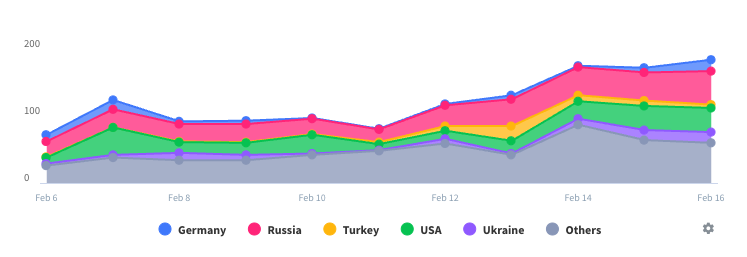App ist vorübergehend nicht verfügbar

Downloads
Umsatz
Beschreibung
The Mediterranean diet is based on the traditional eating habits from the 1960s of people from countries that surround the Mediterranean Sea, such as Greece, Italy, and Spain, and it encourages the consumption of fresh, seasonal, and local foods.1 The Mediterranean diet is not a single prescribed diet, but rather a general food-based eating pattern, which is marked by local and cultural differences throughout the Mediterranean region.
The diet is generally characterised by a high intake of plant-based foods (e.g. fresh fruit and vegetables, nuts, and cereals) and olive oil, a moderate intake of fish and poultry, and low intakes of dairy products (mostly yoghurt and cheese), red and processed meats, and sweets. Wine is typically consumed in moderation and, normally, with a meal.1 A strong focus is placed on social and cultural aspects, such as communal mealtimes, resting after eating, and regular physical activity.2 Nowadays, however, the diet is no longer followed as widely as it was 30-50 years ago, as the diets of people living in these regions are becoming more ‘Westernized’ and higher in energy dense foods.
A Mediterranean diet incorporates the traditional healthy living habits of people from countries bordering the Mediterranean Sea, including France, Greece, Italy and Spain.
The Mediterranean diet varies by country and region, so it has a range of definitions. But in general, it's high in vegetables, fruits, legumes, nuts, beans, cereals, grains, fish, and unsaturated fats such as olive oil. It usually includes a low intake of meat and dairy foods.
The Mediterranean diet has been linked with good health, including a healthier heart.
You can make your diet more Mediterranean-style by:
• eating plenty of starchy foods, such as bread and pasta
• eating plenty of fruit and vegetables
• including fish in your diet
• eating less meat
• choosing products made from vegetable and plant oils, such as olive oil
Ausblenden
Mehr anzeigen...
The diet is generally characterised by a high intake of plant-based foods (e.g. fresh fruit and vegetables, nuts, and cereals) and olive oil, a moderate intake of fish and poultry, and low intakes of dairy products (mostly yoghurt and cheese), red and processed meats, and sweets. Wine is typically consumed in moderation and, normally, with a meal.1 A strong focus is placed on social and cultural aspects, such as communal mealtimes, resting after eating, and regular physical activity.2 Nowadays, however, the diet is no longer followed as widely as it was 30-50 years ago, as the diets of people living in these regions are becoming more ‘Westernized’ and higher in energy dense foods.
A Mediterranean diet incorporates the traditional healthy living habits of people from countries bordering the Mediterranean Sea, including France, Greece, Italy and Spain.
The Mediterranean diet varies by country and region, so it has a range of definitions. But in general, it's high in vegetables, fruits, legumes, nuts, beans, cereals, grains, fish, and unsaturated fats such as olive oil. It usually includes a low intake of meat and dairy foods.
The Mediterranean diet has been linked with good health, including a healthier heart.
You can make your diet more Mediterranean-style by:
• eating plenty of starchy foods, such as bread and pasta
• eating plenty of fruit and vegetables
• including fish in your diet
• eating less meat
• choosing products made from vegetable and plant oils, such as olive oil
Screenshots
Meditterranean food Häufige Fragen
-
Ist Meditterranean food kostenlos?
Ja, Meditterranean food ist komplett kostenlos und enthält keine In-App-Käufe oder Abonnements.
-
Ist Meditterranean food seriös?
Nicht genügend Bewertungen, um eine zuverlässige Einschätzung vorzunehmen. Die App benötigt mehr Nutzerfeedback.
Danke für die Stimme -
Wie viel kostet Meditterranean food?
Meditterranean food ist kostenlos.
-
Wie hoch ist der Umsatz von Meditterranean food?
Um geschätzte Einnahmen der Meditterranean food-App und weitere AppStore-Einblicke zu erhalten, können Sie sich bei der AppTail Mobile Analytics Platform anmelden.

Benutzerbewertung
Die App ist in Südafrika noch nicht bewertet.

Bewertungsverlauf
Meditterranean food Bewertungen
Keine Bewertungen in Südafrika
Die App hat noch keine Bewertungen in Südafrika.
Meditterranean food Installationen
Letzte 30 TageMeditterranean food Umsatz
Letzte 30 TageMeditterranean food Einnahmen und Downloads
Gewinnen Sie wertvolle Einblicke in die Leistung von Meditterranean food mit unserer Analytik.
Melden Sie sich jetzt an, um Zugriff auf Downloads, Einnahmen und mehr zu erhalten.
Melden Sie sich jetzt an, um Zugriff auf Downloads, Einnahmen und mehr zu erhalten.
App-Informationen
- Kategorie
- Food Drink
- Herausgeber
- Unknown
- Sprachen
- English
- Letzte Veröffentlichung
- 1.0 (vor 3 Jahren )
- Veröffentlicht am
- Apr 14, 2021 (vor 3 Jahren )
- Auch verfügbar in
- Kuwait , Südafrika , Vietnam , Vereinigte Staaten , Taiwan , Thailand , Singapur , Pakistan , Philippinen , Neuseeland , Nigeria , Mexiko , Kasachstan , Österreich , Italien , Indien , Vereinigtes Königreich , Frankreich , Ägypten , Dominikanische Republik , Dänemark , Deutschland , Schweiz , Brasilien , Belgien , Australien
- Zuletzt aktualisiert
- vor 1 Jahr
This page includes copyrighted content from third parties, shared solely for commentary and research in accordance with fair use under applicable copyright laws. All trademarks, including product, service, and company names or logos, remain the property of their respective owners. Their use here falls under nominative fair use as outlined by trademark laws and does not suggest any affiliation with or endorsement by the trademark holders.
- © 2024 AppTail.
- Unterstützung
- Privacy
- Terms
- All Apps



